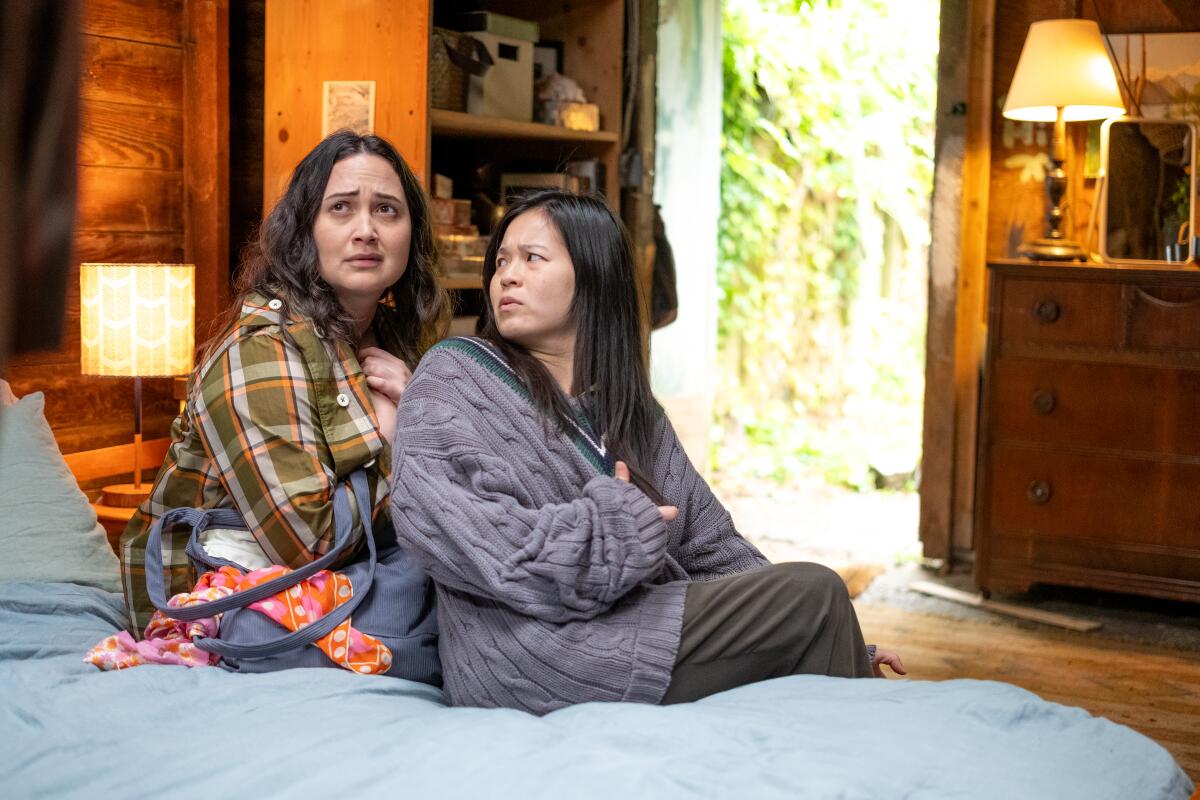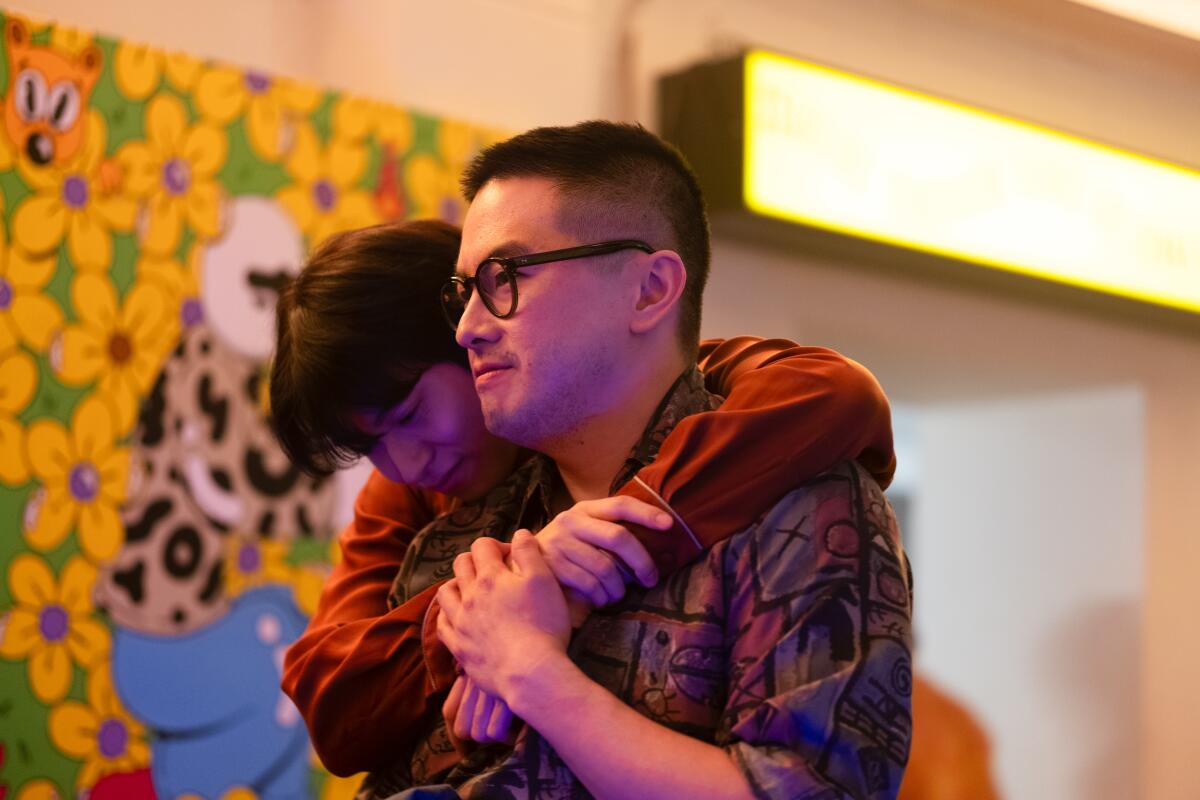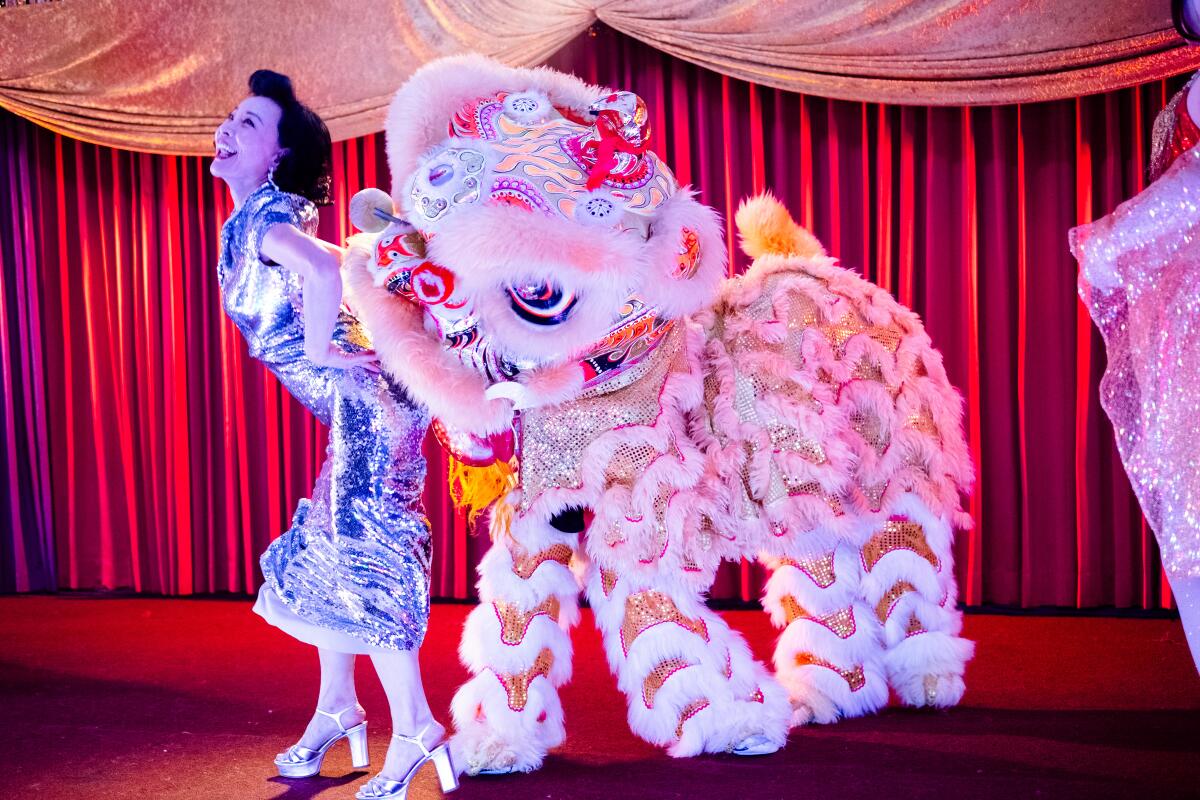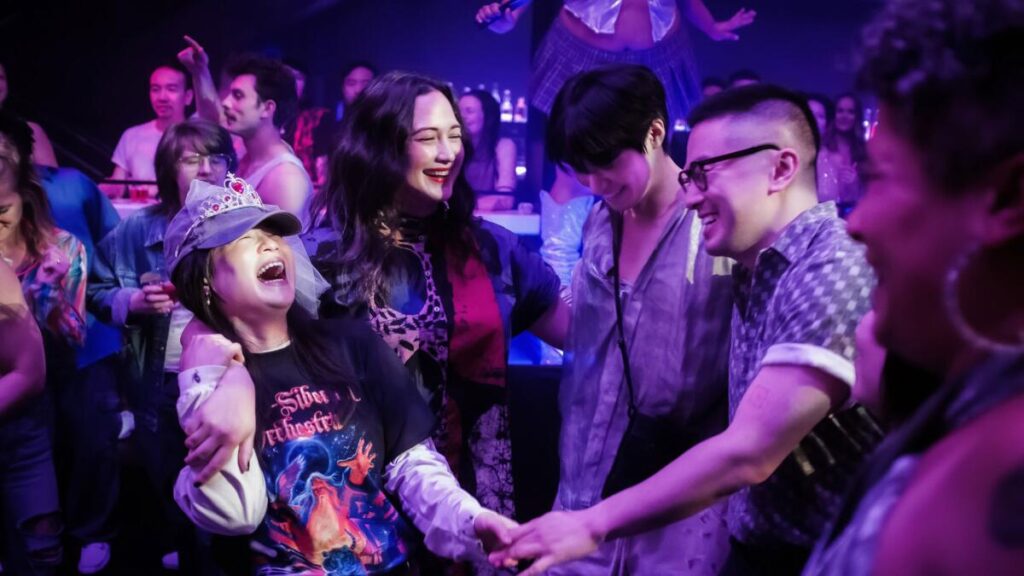When actors Kelly Marie Tran and Lily Gladstone met shortly before shooting their first scene together on “The Wedding Banquet,” director Andrew Ahn tasked them with coming up with secrets about their characters — ones he wouldn’t know about.
This included secrets their characters shared as a couple, as well as individual things the pair was meant to keep from each other. “Saturday Night Live’s” Bowen Yang and South Korean film newcomer Han Gi-chan, also in the movie, were given the same homework during their first meeting with Ahn.
“It was a very quick way to create a history,” Tran, 36, says on a recent joint Zoom call with her three castmates as they reminisce about their time filming in Vancouver last year.
Whether these secrets were actually kept is another matter, though.
Gladstone, 38, admits she ended up telling Tran her character’s secret. (“Sorry, but it gave me empathy and ability to be forgiving later,” she jokes.) Tran, meanwhile, can’t remember her character’s secret, but believes she was so repressed in the beginning of the film it was probably a secret even to herself. “I’m sure you disclosed it anyway,” says Gladstone, teasing.
Han, 26, remembers running his character’s potential secrets by Yang, 34, to get feedback on them. (This isn’t really following the assignment.) They tell me their characters’ shared secret was that they met at a lake where one of them was birdwatching.
This sense of shared history — even a history never seen or expressed — helps to ground the close-knit foursome of friends the actors portray in “The Wedding Banquet.” An endearing and delightful reimagining of Ang Lee’s queer 1993 rom-com landmark, the film, which premiered at January’s Sundance Film Festival to strong reviews, hits theaters April 18. In Ahn’s updated take, which he wrote with the original film’s co-screenwriter James Schamus, the central marriage farce has been expanded to involve two queer couples caught in a web of lies and secrets of their own making as they try to forge their own happily-ever-afters.
Kelly Marie Tran, left, Lily Gladstone, Han Gi-chan and Bowen Yang in the movie “The Wedding Banquet.”
(Bleecker Street / ShivHans Pictures)
Making up one half of the quartet is Angela (Tran) and Lee (Gladstone), devoted partners whose IVF journey has so far been unsuccessful and who are unsure of how they can afford more treatments. Then there’s commitment-phobic Chris (Yang), Angela’s best friend, and his boyfriend Min (Han), an artist and the heir to a giant multinational corporation who is not out to his conservative family in Korea.
With his student visa about to expire, Min proposes to Chris in hopes of continuing the life they’ve been building together. Chris, however, turns him down, so Min pivots to Angela with an offer: If she marries him so he can obtain a green card, he will fund Lee’s IVF treatments. But their plans hit a snag when Min’s grandmother (Oscar-winner Youn Yuh-jung of “Minari”), suspicious of her grandson’s faux romance, unexpectedly arrives from Korea and the makeshift couple is forced to have an extravagant wedding befitting Min’s family status.
Despite “The Wedding Banquet’s” outlandish premise, the film is a heartfelt look at the concept of chosen family, as well as the ways our families of origin have shaped us.
“It was just so natural and organic to have kindness be the binding agent for these four people,” says Yang, who previously worked with Ahn on the 2022 comedy “Fire Island.” “And I feel like that is what chosen family, especially queer chosen family, is built on.”
This kindness, according to the actors, permeated the production in every direction, fostering patience and openness among the cast and crew.
“Something that was so special about making this movie was that I don’t think any of us really had to hear an explanation or definition of what chosen family was,” remembers Tran, known both for portraying a Rebel mechanic in “Star Wars: The Last Jedi” and a Disney (warrior) princess in “Raya and the Last Dragon,” for which she voiced the title character. “I remember constantly having different crew members come up to us and just say how special it was to be on a queer set, because so many of them were queer as well and had never worked on anything that was primarily queer in its cast and its crew. It was just this contagious feeling on set — it just felt really magical.”
The affection the actors have for each other is palpable even across the separate boxes they occupy on-screen during our Zoom call across several different time zones, including New York and South Korea. It can be felt as they share laughs about a well-timed joke about being “pro-butt” (you had to be there) and when Han brings up the times he would have everyone listen to his favorite song, “Complicated” by Avril Lavigne. It’s there when everybody coos at Han’s white cat making a surprise appearance — and even in how quickly they offer to lip-read and interpret Gladstone’s comments while she’s sorting out her mute button.

Lily Gladstone, left, and Kelly Marie Tran in the movie “The Wedding Banquet.”
(Luka Cyprian / Bleecker Street / ShivHans Pictures)
In addition to hanging out and going on hikes, the list of bonding activities from their time in Vancouver includes going to see an elderly Vancouver Korean choir perform “Mamma Mia” and attending a screening of “Fancy Dance,” an indie film starring Gladstone that hit theaters while they were shooting. But what really brought them closer together, Yang insists, was reality TV, specifically the show “Couples Therapy.”
“The ‘Couples Therapy’ viewing, I think, was very instrumental in accelerating something between the four of us,” says Yang, who kicked this off with his co-stars upon the release of the show’s fourth season. “I will always cherish those moments of us watching it together.”
“I loved that,” adds Gladstone, whose Lee in the film bonds with Chris over “The Real Housewives of Salt Lake City.”
“I’m not a person who watches a ton of reality TV,” says the “Killers of the Flower Moon” star. “But finding a show where the human behavior was central to solving these interpersonal issues that couples have — I thought it was a brilliant thing to put on, intentional or not. It’s what good storytellers do. You find other stories to prop up the one that you’re telling.”
It’s easy to see why Gladstone describes “The Wedding Banquet” as “a really high quality-of-life project.” The film was the first one the actor signed onto after the Academy Award nomination she earned for “Killers” brought her a new level of attention.
“Some projects take you away from home for several months [and] put you into a headspace that’s not pleasant for most of your day,” says Gladstone, who recalls she had been looking to be a true part of an ensemble. “This one felt like a really nice somatic journey because it’s a healing one. It’s a joyful one. It’s one that has a happy, desired outcome ending.”
Gladstone is quick to explain that for her, “chosen family is family.”
“Genealogy in Indian country is very maintained — you know who you’re related to, you know who you’re not,” she says. “There’s a whole swath of my family that are cousins, but if you go back, they’re cousins through adoption, they’re cousins because it’s chosen family. I think culturally, chosen family is absolutely a subjective thing. Individually, it’s a subjective thing. But what’s common is you choose a family based upon where you’re accepted, where you’re celebrated, where you’re loved — for who you are.”

Han Gi-chan, left, and Bowen Yang in the movie “The Wedding Banquet.”
(Luka Cyprian / Bleecker Street / ShivHans Pictures)
For Han, best known for his role in the boy-love Korean drama “Where Your Eyes Linger,” “The Wedding Banquet” marks his first role in an English-language project. While he was excited for the opportunity, he admits he was a bit nervous and credits his castmates and Ahn for how he was able to shake it all off in order to immerse himself into his character and “feel how Min really creates his own family — not just his grandma’s and his family’s expectations — [and] finally gets what he truly wants.”
“By filming this movie, I was learning about chosen family and how queer community outside Korea works,” says Han, who describes his time on the film as an adventure. “Before that, I didn’t know a thing … but now I’m talking in these interviews and answering all these questions [and I keep learning] more about global issues and LGBTQ society, but it’s a totally new experience for me.”
His castmates are quick to prop him up. Gladstone is effusive in her praise of Han’s commitment to every scene and his ability to “capture the comedic nuances.” Yang calls him “perfect” and “brave” and applauds Han for how he “plays to those scenes in a way that is universal and therefore funny, in a way that transcends language.”
And while Han may not be a part of the LGBTQ+ community in real life, Yang says, “He knows how a queer person thinks or feels because it’s how anyone would think or feel.”
The stakes are much more internal but no less significant for Yang’s character, Chris, who spends much of the film trying to figure out how he fits into the new dynamic between Lee, Angela and Min after turning down his boyfriend’s proposal because he’s neither a part of the fake marriage nor the fertility journey.
“He’s paralyzed by his decision to the point where he is not an essential part of his friend group anymore,” said Yang. “He spends the whole film not really sure how he is needed.”
For Tran, “The Wedding Banquet” was a chance to explore themes and issues that she felt were “weirdly very pertinent to [her] own life” — specifically, Angela navigating her frustrations with her mother, May (Joan Chen), whose over-the-top allyship presents its own challenges.
“It’s so rare when you get to work through something you’re dealing with in your own personal life,” says Tran. “I come from a really conservative family and coming out to my mom was very complicated. I think you can see that through Angela. But it’s been a really emotional experience to have been celebrating this part of myself and to feel like I can maybe not do that with certain members of my family.”

Joan Chen in the movie “The Wedding Banquet.”
(Luka Cyprian / Bleecker Street / ShivHans Pictures)
While it was not something she had planned on, Tran came out publicly in an interview with Vanity Fair during a set visit. And though she generally keeps from sharing much about her private life, Tran is glad it happened organically in a conversation.
“I didn’t want to feel like I was hiding,” says Tran. “I was making this movie at that time and thinking how beautiful it was that we got to celebrate this part of ourselves. And I was like, how hypocritical of me to not just share that.”
Because her role was written without a specific ethnicity or cultural background attached, Gladstone saw an opportunity when suggesting a new name for her character: Lee. She chose the name to honor Princess Angeline, the daughter of Chief Seattle (or Si’ahl), the namesake of the city and a well-known Duwamish leader, because the film was set on Duwamish land. Making Lee a Duwamish character was not only an opportunity for creating representation, but it also helped to further ground the stakes for the character, who, in addition to trying to have a baby, is fighting to keep her home.
The “Duwamish are not federally recognized,” says Gladstone, so Lee keeping her house that they share “was an act of resistance.”
And it’s important for Lee to carry their child with her eggs because “it’s continuing that ancestral line,” adds Gladstone. “When 90, 95% of your population is wiped out through acts of genocide, it’s important to pass that forward.”
Chris’ storyline, on the other hand, involves his relationship with his easygoing younger cousin, Kendall (Bobo Le), who in initial scripts was just another close but unrelated friend. It was only after Bobo was cast that Ahn brought up the possibility of making Chris and Kendall related.
“That [gave] it the perfect wrinkle, because it becomes a fixed family narrative for Chris, and now all four of them have something,” Yang says. “I think the reason this film is so good at landing all of these stories as they all meet in the middle of this chosen family is because they are all being pulled on the opposite end by fixed family.”
The cast is also aware that the film is arriving at a time when the queer community is increasingly under attack by vocal anti-LGBTQ+ voices and politicians. This climate is one of the reasons Tran felt compelled to be open about her own identity and personal story.
“If there is a queer Asian girl somewhere who doesn’t have access to chosen family, who doesn’t have access to queer community centers and places where she can feel accepted, I want her to be able to point to someone and see there is somewhere outside of here where I could be accepted,” says Tran.
“I think we’re all really happy to be providing this experience that’s an accepting, loving, chosen family home in a time when it’s difficult,” Gladstone says.
This Zoom has felt like an oasis from that, as does the film itself — as full of queer joy as the environment it was made in.
Content shared from www.latimes.com.

